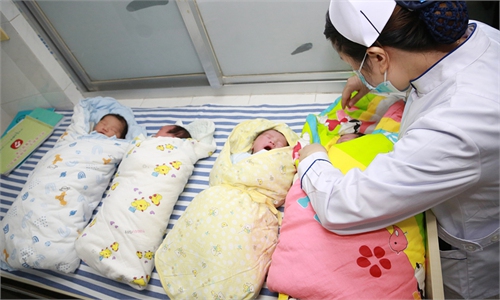Reuters report on China's COVID-19 policy's damage to childbearing 'groundless': experts

A child and his parent read a book together at a bookstore in Nanjing, east China's Jiangsu Province, July 17, 2022.Photo:Xinhua
Chinese experts have refuted a Reuters report claiming that China's dynamic zero-COVID strategy may have caused "profound and lasting damage to the desire to have children," saying that such comments are far-fetched and groundless, and factors such as a lack of nursing services are more prominent factors in childbearing.
The report came amid the Western media's long-term defaming and criticism of China's dynamic zero-COVID strategy, in which the latest example is to hype the theory that China's epidemic prevention measures have made people less willing to have children.
In an article published on Tuesday, Reuters quoted China's National Health Commission (NHC) as saying that COVID-19 has contributed to the fast dropping of the country's marriage and birth rates that accelerated in recent years.
It then cited demographers as noting that China's dynamic zero-COVID policy with "strict controls on people's lives" might have led to "profound, lasting damage" to their fertility desire.
The COVID-19 pandemic might have added uncertainty to the marriage or fertility arrangements of some people in China, especially those whose jobs were affected, but it is not clear how much and by what mechanism the epidemic contributed to the decline in the birth rate, which is influenced by a lot of factors, Lu Jiehua, a professor of sociology at Peking University, told the Global Times on Wednesday.
"If the impact of the epidemic is uncertain, it is more difficult to determine the impact of the dynamic zero-COVID strategy on the birth rate. For example, the home quarantine policy might play a positive role in promoting the fertility rate," he added.
Women of childbearing age in China have a low desire to have children, and the country's total population will see negative growth during the 14th Five-Year plan (2021-25) period, said a report that the NHC released on August 1. It also noted that the population's development in China is facing profound change, where an aging society with fewer children will become the new normal.
China introduced support policies in a guideline that was jointly released by 17 government agencies on August 16 to create a friendly environment for marriage and fertility, and promote population growth, including measures to develop equitable nursery services across the country, as a lack of proper people to care for children is believed to be the primary factor that prevents childbearing.
In a separate article by Reuters, the media outlet noted that under China's dynamic zero-COVID strategy, Chinese people's feelings of losing control over their lives from events such as losing income or not having access to healthcare or food can "have major consequences on parenthood goals."
Refuting the comments, Du Peng, a professor at the School of Sociology and Population Studies at the Renmin University of China, told the Global Times on Wednesday that China's dynamic zero-COVID strategy that prioritizes people's health has provided a safer environment for Chinese people in both their lives and work, and under the current policy, control measures are only taken in a few places with high COVID-19 risk regions. Life in the vast majority of other places isn't greatly affected.
China's epidemiologists previously pointed out that contrary to the opinion of some people that dynamic zero-COVID has a huge impact on the economy, the measure actually protects the economy to the largest extent, said Wu Zunyou, chief epidemiologist of the Chinese Center for Disease Control and Prevention.
Du said that hyping China's dynamic zero-COVID policy's negative impact on China's fertility rate is a tool for Western media outlets to smear China's epidemic prevention measures.
Experts noted that a low fertility rate relates to social development, increasing levels of higher education and other factors, and any temporary policy has little effect on the general trend.
Amid the COVID-19 pandemic, other countries in the world have also seen declines in fertility rates.
South Korea's total fertility rate hit a record low in 2021, with the average number of children a woman bears in her lifetime down at 0.81, the lowest since the statistics agency began compiling related data in 1970, reported the Yonhap News Agency on Wednesday.
Amid the downtrend of marriages, more people in South Korea have postponed or delayed their weddings due to the COVID-19 pandemic, reported the agency.

